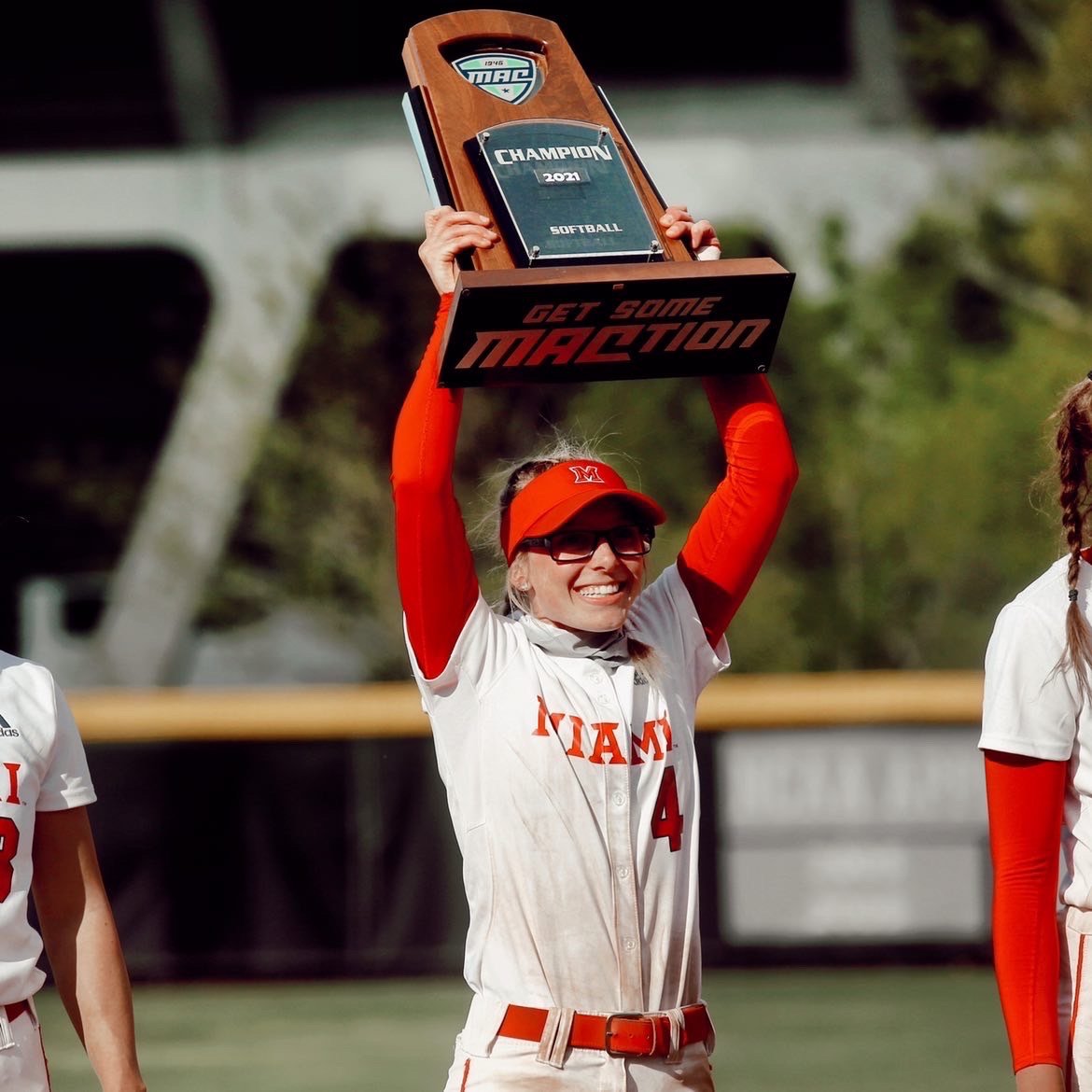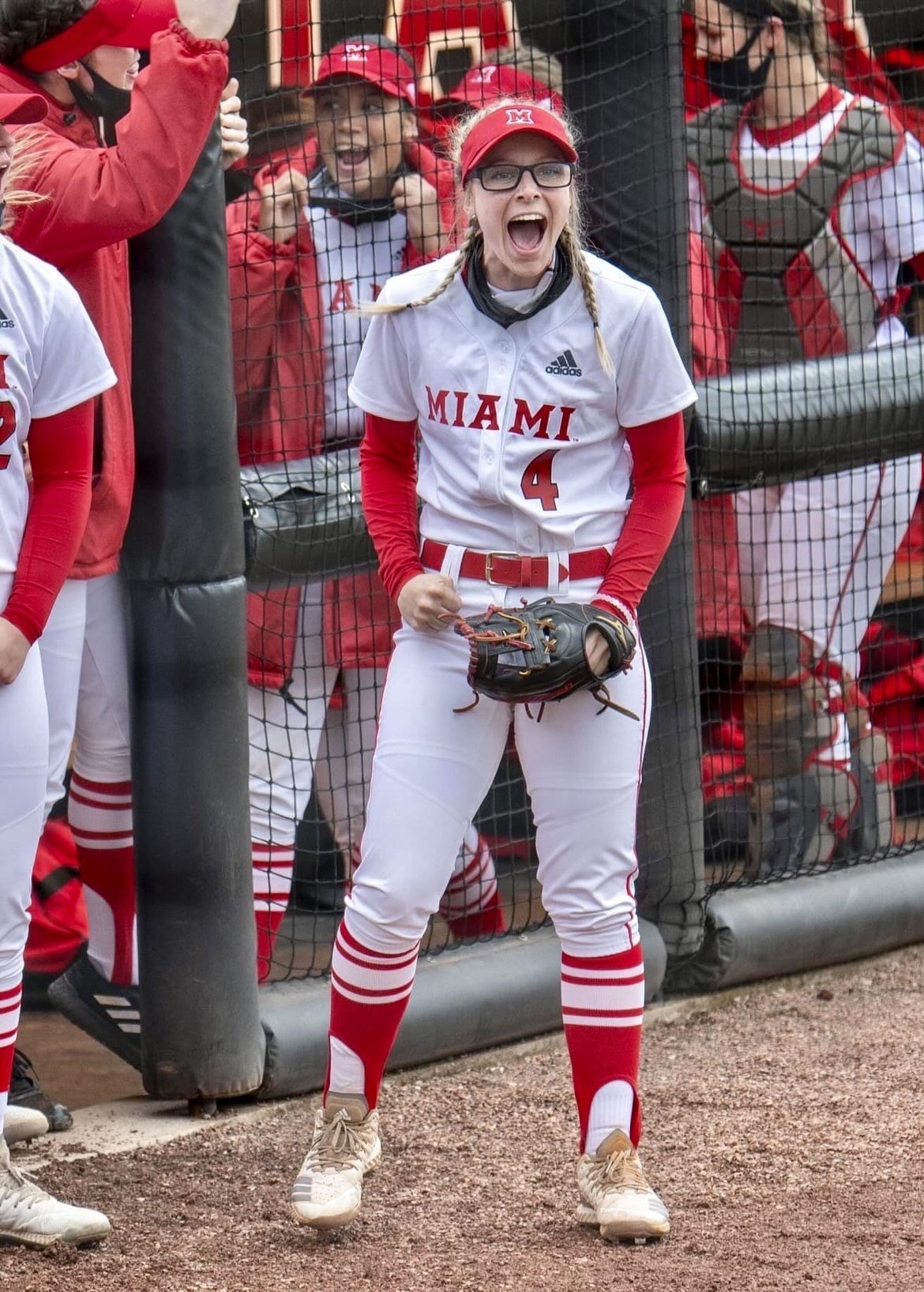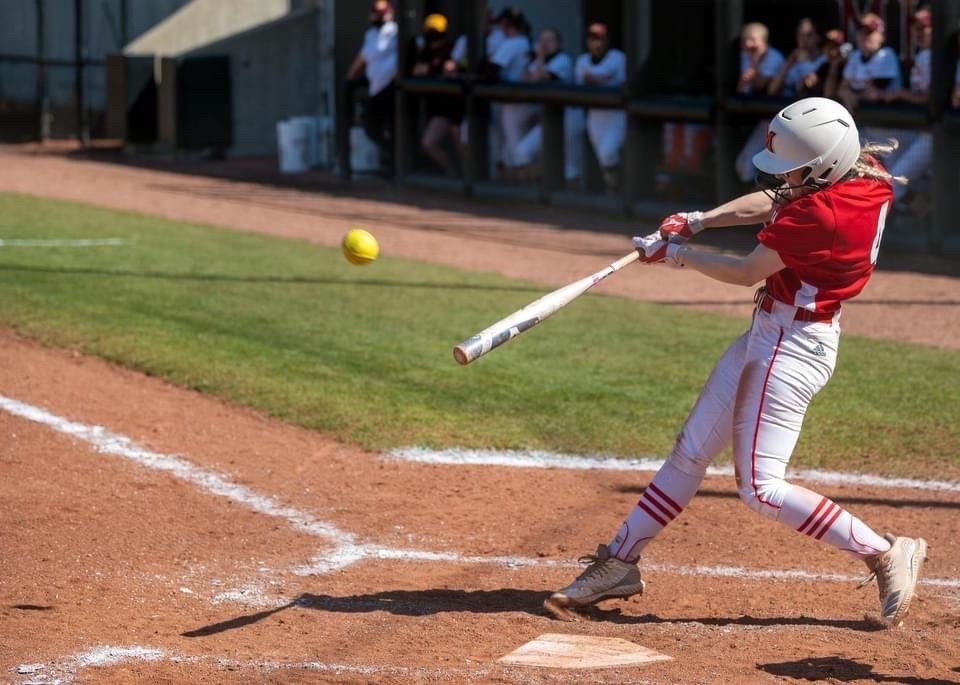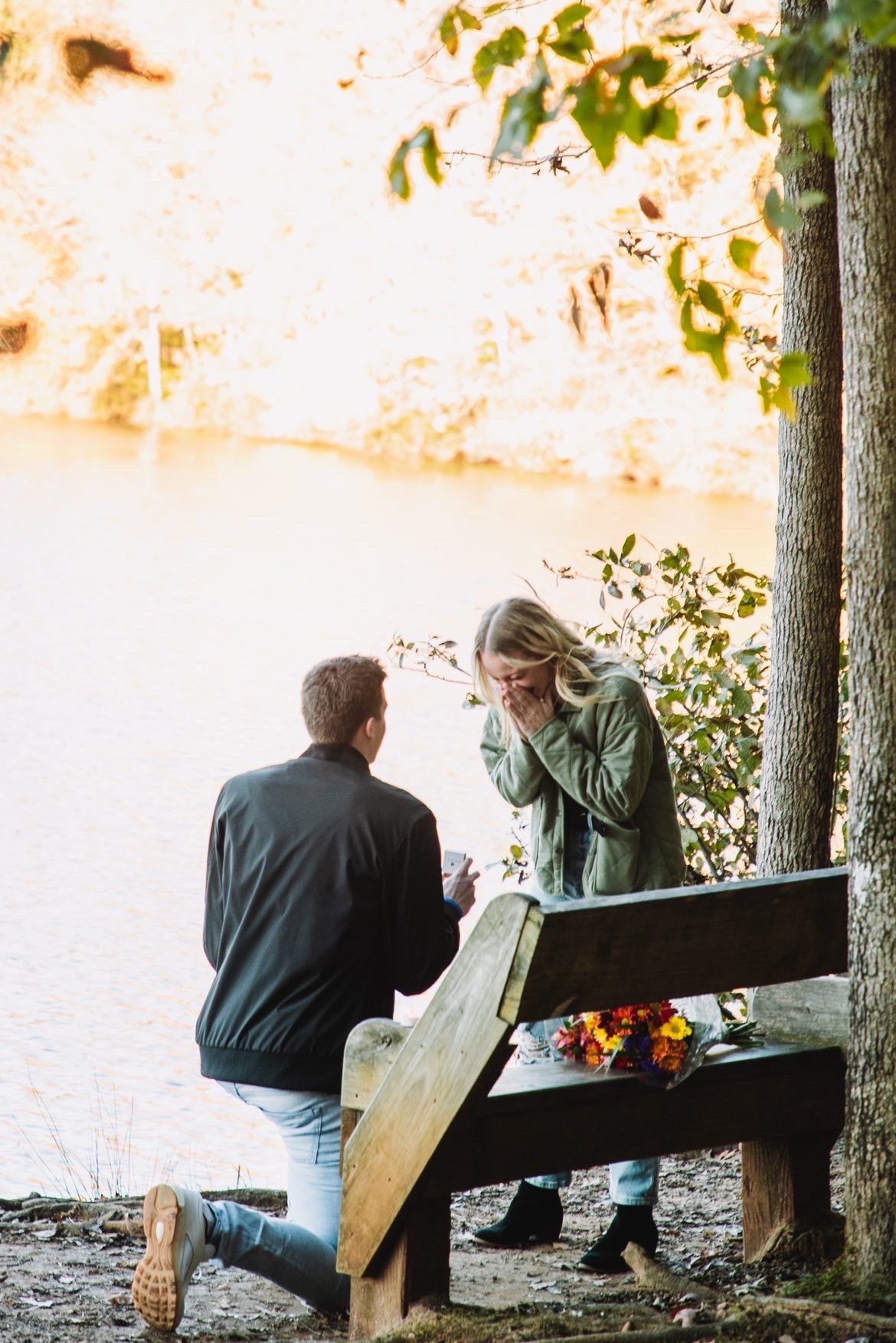Softball player with unusual injury/condition interview: Mackenzie Moore Baumann
Mackenzie Moore Baumann played softball at Miami University in Ohio. She graduated in May of 2021 with her degree in Kinesiology. She is currently engaged (update - married!) to Noah and living in Arizona. In her free time she recently discovered that she loves doing spartan races. She does kickboxing and Muay Thai to stay active as well. Mackenzie is always around babies as she is the oldest of 19 grandkids in the family and they’re all children. This led to her becoming a nanny, but she’s also frequently babysitting for her family and caring for children. We’ll be talking about homesickness, recovering from a pretty big and unique injury, coaches not believing in her, and the transition out of college athletics.
Below I have written most of what we talked about but you can listen to the full podcast on Anchor / Spotify or on Apple Podcasts.
Q: You went to school very far from home. Where is home and how did you handle the homesickness?
A: I am from Phoenix, Arizona and I moved about 1800 miles away to Oxford, Ohio. It’s the smallest town I’ve ever been to or ever heard of.
It’s about 45 minutes away from any type of highway. It’s in the middle of nowhere and in the middle of cornfields. The town is the college.
Homesickness was really hard for me because I came from a really big family, my boyfriend was on the other side of the country, and all of a sudden I’m going from the desert to the cornfields.
Not only was I homesick but there was a culture shock.
It was just a lot.
When I first moved there, the homesickness consumed me.
I was sad all the time missing my family, missing Noah, missing my norm.
The way I coped with that was trying to get out of my dorm.
What also helped was getting a home cooked meal from one of our assistant coaches who would always cook us meals in the dorms. I wasn’t eating dining food as much any more so it feels like home.
It really helps that my mom is a flight attendant. She purposefully became a flight attendant when I started going on college visits my sophomore year of high school knowing I would go away.
I’m her first baby, her oldest, so it freaked her out.
She became a flight attendant around 8 or 9 years ago so she was able to fly and visit me every other weekend the first couple of months of college.
That was really key for me that my mom was always there and sometimes she would bring my sister.
I was really lucky in that first semester when homesickness was the worst to have family visit me so often.
It was the most perfect scenario for her to become a flight attendant to be able to come visit me. Home really is where the heart is.
Q: When did your injury / condition start affecting you? What has that journey been like?
A: This is probably the craziest story / injury. It started freshman year of high school softball season.
About two or three weeks in I started to feel groin pain, like adductor pain.
It would hurt when I would move laterally or go to cut, take a ground ball, or even when I would rotate to swing.
We thought it was an overuse injury with being in club ball all summer and going into high school ball in the fall.
I would sit out a week or two every year in high school and that would do the trick.
About a month before I was going to move to Ohio, I was playing in Colorado.
I had made a move at shortstop to get a runner out, I rotated to tag the runner and I felt a pop in my pelvis.
It was a really weird spot to feel a pop. I went to run to the dugout and I couldn’t run.
I was kind of waddling. I couldn’t move my legs apart from each other. On top of that, I started bleeding.
It was a weird and kind of scary time. I sat out the rest of the tournament.
When I got home I saw a women’s doctor and a sport doctor.
The sport doctor told me that I had tendonitis.
The women’s doctor said she couldn’t see anything wrong.
Later on, the same kind of thing happened on the field. I collapsed on the field and I was bleeding down my leg.
At 18 years old, I shouldn’t be having these issues. I go see doctors again and they can’t figure out what’s wrong.
Fast forward to college, I’m starting in our first fall game against IU.
I was playing the best defense I’ve ever played. But then the same thing happened where the same pains I had months ago happened again.
I’m thinking that everyone’s going to hate me and think I’m making stuff up.
I go to the bathroom and I was bleeding down my leg.
I’m seeing all these doctors and no one is giving me answers.
One doctor told me I had a stress reaction in my pelvic bone.
The only way you break your pelvic bone is if you were in a car crash or you’re an old person.
I’m a strong, young person so I know I’m good.
The only reason they thought that was because the MRI showed a lot of problems all over the pelvic bone.
I sat out the rest of the fall season which was devastating.
I sat for 3 or 4 months and then my coach made me run the fitness test.
After I finished it I was bawling because the pain came back. It felt like I just sat out for all that time for nothing.
We get a new doctor because the first doctor was trying to blame it on my uterus but it wasn’t that.
They decided to give me an injection in the cartilage in my pubic bone. Things felt fine for a few days after it.
We have a game at home against Michigan and I’m playing shortstop.
There’s a play that I jumped to get and immediately the pain came back.
I am bleeding down my leg and I can’t walk. I’m begging for help at this point.
Again, no answers.
They just inject me again.
It felt like a bandaid to help it feel better for a few weeks.
Go home after freshman year and that summer I rest. When I go back in the fall, the pain is still there.
The doctor I had sent me to a specialist that was high up in the sport world.
I go to this guy and he decides it’s nothing in my hip so he’s going to refer me to Dr. Meyers in Philadelphia who does core repair reconstructive surgery with all the big athletes.
We tell the doctors at Miami that we think this guy can fix it so they fly me and my mom to Philly.
We do all these tests and an MRI. Just looking at the first image he’s like, “oh, yeah your adductors and ab muscles are about to fall off the pelvic bone. The tendons are so stretched and so weak, there’s no stability there and your bone is weak”.
He said this is one of the worst cases he’s seen and was wondering how I was playing with this.
I go into surgery to get core reconstructive surgery. It was pretty intense but a quick surgery.
It only took about 6-8 weeks to get back to running but it was the most painful thing I’ve ever experienced.
I couldn’t sip out of a straw, I couldn’t cough, I couldn’t laugh, I had to learn how to walk again.
My whole core was sliced and diced. It was horrible but I was happy because I was thinking this is it, this is what’s going to get me to feel better.
Come spring, I’m ready to go and I’m playing a new position.
When we go to Vegas for our second weekend of games, all the pain came back in one play again.
We found a way to make me be able to play games. I had to suck it up a lot and I had to rest a lot.
My junior year in the fall I needed answers. The pain and the bleeding was out of control.
I found a physical therapist in Arizona who specializes in pelvic floor stuff. It’s really invasive and kind of awkward and it’s internal.
She found the pain spot and it was an uncomfortable moment but she found it.
She told me that yes, my core was messed up. But the underlying issue is that my pelvic floor is so tight and it’s not relaxing.
She said that is a place most people carry emotional trauma. My body holds a lot of sadness and emotions in that area.
If I’m not able to release those emotions, the muscles stay really tight.
How does that much pain be caused by emotional trauma?
We’ll get into this later but when I had a better coach I didn’t have as much pain so it made sense.
Once I was able to understand that, work through my emotions and go to PT, I was able to play pain free 95% of the time.
It was really tough physically but mentally it was even harder.
One of the times I had a bleeding episode, I passed a mass.
The doctors told me I could have had a miscarriage. It wasn’t a miscarriage but it’s strange how I passed a mass.
Another doctor told me the pain I was feeling was very similar to contractions in childbirth.
We do know now that it’s just my pelvic floor. I know what exercises and motions trigger it. It’s manageable now.
Q: How did you handle coaches not believing in you? How much of a difference was it to you when you finally had a coach that believed in you?
A: The coach I had my first 3 years was someone I was really excited to play for.
Leading up going to college, I would talk to her for an hour every Wednesday.
I felt like we had become good friends and she was someone I could look up to.
I had full trust in her. I couldn’t have been more wrong.
When I got there and I was dealing with homesickness and the injury, she was no help to me.
She pretty much thought I was making it up, thought I was weak, told me that mental health wasn’t real and I’m not the kid she recruited.
It was a lot of crazy things to tell such a young girl from so far away. It was disgusting. It made everything harder.
She was supposed to take care of me and convinced me for years to come play for her and it was all a lie.
I tried to communicate with her the best I could.
She would always say that if we ever want to talk to her about anything then just come to her office and let’s chat.
I didn’t know that no one has gone in her office before. In the first month of softball there was a target on my back. She hated that I stuck up for myself.
I was trying to have an adult relationship by talking with her in her office. I just wanted to get on the same page as her.
She didn’t believe me that I was in pain. After my surgery, she came into the PT room the day after my surgery and she told my trainer “I feel so bad, I thought she was faking it the whole time”.
She never told me, though. If she would have apologized and admitted that to me, maybe that would have helped that pain.
I needed to hear that. Having a coach that didn’t believe in me, I didn’t play very well.
I didn’t want to play scared of her but I couldn’t help it feeling like I was under a microscope.
Playing in fear is the worst state as an athlete. I tried to have confidence in myself. The assistant coaches weren’t much help either. The whole culture was toxic.
How are you supposed to feel and play your best when everyone around you is just toxic?
My mom was still able to visit me a decent amount. She did get diagnosed with thyroid cancer my sophomore year so I didn’t see her as much after that. I don’t remember much of that year. I guess I blacked it out.
When Coach 2K, Kirin Kumar, came in as head coach my senior year, it was a breath of fresh air.
I can’t leave college feeling so bitter about my college experience.
Coach 2K knew so much about softball and was always teaching us new things. All of a sudden I’m hitting like I’ve never hit before.
I’m the smallest girl on the team but I’m hitting 3 or 4 hole in games. I was able to sprint again; I was able to squat.
What’s the key? Oh, I’m not being torn down mentally and screamed at every day.
I prayed that things would get better and Coach 2K was that answer to the prayer.
She gave me that spark back to the game. It truly made me realize that when you truly have a good honest wholehearted person at the top of your program, anything is possible.
Q: You’ve struggled with placing your worth on your sport in the past. How did you overcome that?
A: It’s so easy to put your worth on who you are as a person in your sport.
It’s easy to feel like a loser when you’re losing and a winner when you’re winning. It’s easy to put all of those emotions into who you are as a person.
Now that I’m out of the sport and looking back I’m realizing it was a sport, what was I doing?
It felt like the sport was my world but it was a tiny piece of my life. I put who I thought I was meant to be in a softball game.
When things were really rough my first 3 years I struggled with that immensely.
Before 2K came, I knew I had to do something different to pull myself out of this rut. I put my worth and my personal believe into Jesus Christ.
That was something I always tried to do. I’m playing for an audience of one. I’m playing for God. My worth is in Him.
But it actually wasn’t. I said it was but I didn’t actively do that until I changed my mindset.
Going into my senior year I knew something had to change. If it didn’t go the way I wanted it to, I needed a way to cope with that.
That was me saying that no matter what happens, I am worthy. I am way more than a softball player. I’m a strong individual, I’m happy, I’m a leader, I’m smart, I’m funny, I’m a great girlfriend and a great sister.
I had to convince myself of that. In order to do that, I put my full worth in Jesus.
I changed the way I prayed. I used to pray super selfishly saying “God, please help me hit a double”. I changed the way I prayed to “what are you teaching me with these failures?”.
I had learned that I can overcome a lot and prayed to know what things can teach me.
When I was able to put my worth into Jesus and know that no matter the outcome of games, I am Mackenzie and I’m a child of God.
I was at peace my whole senior year. Even if things were’t perfect I still felt good. I am going to be living through that year for the rest of my life because it was the best year ever.
I was sick of always being like why am I always hurt? Sometimes there’s not always a ‘why’ and that’s where my faith comes in.
I remember I had a moment where I felt so defeated and sobbing after a really terrible exit meeting and I thought to myself, “I’m going to use this moment for good one day”.
Here I am recording a podcast using it for good.
Q: What was one of your favorite moments while competing?
A: My senior year our last home game. We needed to win this game to clinch the regular series.
We were playing our rival Ohio University called the Battle Of The Bricks.
I remember in that game I had 2 really tough outs where I had shots hit right to people.
Coach 2K would tell me to just keep doing what I’m doing. I wasn’t supposed to have my last at-bat because I got hit in the hand right before that so the trainer told me not to hit but I was like no, I’m going to hit.
I go up to bat and Coach 2K says again to keep doing what I’m doing. I’m annoyed that she kept saying that. Lo and behold, I hit a homerun that at-bat. It was an amazing time.
Q: What was the transition out of playing competitive sports like for you? What did you do in your newfound free time?
A: At first when I got out of it, it was pretty easy. I ended on a high and I was happy how I ended college softball.
I thought about taking a fifth year but I decided not to and to move to Georgia to be with Noah.
At first it was easy, I was happy I was like I’m done, I have all this free time, I can be with Noah, my body can heal.
Come November about 6 months after being done, Noah’s basketball season started. It kind of hit me that I wasn’t gonna compete like that again.
I wasn’t surrounded by 20 likeminded girls, I wasn’t in that environment, I didn’t have a lot of friends.
That competitive fire in me was just dead and I hated that because that’s a huge part of me.
Once that hit me, I knew I needed some kind of competitive outlet so I signed up for my first Spartan race.
I needed something to work towards and train for. I started doing Muay Thai and that was fun. I was able to challenge and push myself and learn a new skill. I loved the challenge and it was fun.
I do tell a lot of my friends who just graduated or are about to graduate that you have to be vulnerable and know that you were all that at one point and now you’re just a regular person and do regular people things.
People aren’t going to care that you were a division one athlete. I had to find different outlets to compete.
In Georgia I made my first friend that was not involved with sports. When we would hang out we didn’t talk about softball and it was a whole different type of friendship. I was so grateful for that.
That was another thing I had to learn how to do was how to make friends outside of my sport.
That’s why I’m glad there are things like this that are educating athletes on the transition out of sports.
It’s hard and I wish I had someone last November to talk to about how to fuel my competitive spirit, how to make friends, and finding a job.
No one talks about this stuff. When you’re in school, you’re an athlete, period.
Q: What aspect of the transition out of sports was the hardest for you? What advice can you give to athletes on what you learned from that?
A: The hardest part was just not being called an athlete anymore. I needed to push myself like I did my whole life.
Since you’re a kid you’re having 3 or 4 hour practices 4 times a week.
Suddenly when I had all this free time I’m like what do I do.
Finding that competitive outlet kickboxing and spartan races and I think was key.
Creating a different community and finding that outlet that gives you that spark, that little girl on the softball field feeling, is so important.
If you have any more questions for Mackenzie, please leave comments below or contact me. If you or someone you know is struggling, please call or text the Suicide Hotline. It’s toll free and available 24/7 at 988 or 800-273-8255.
Rose Medal’s mission is to provide resources and support for current and former athletes. Please support our mission by making a donation. We are a 501(C)3 nonprofit so your donations are eligible to be tax deductible.
Are you or someone you know currently struggling with what happens in life after sports? Or did you already go through that transition to life after retiring competitive sports and wish you had more resources and support? Have you ever wondered, “what do athletes do after they are done playing sports? What’s next after sports?” Do you feel like you dedicated so much to your sport and you don’t know what to do now that you’re done competing? You’re not alone. Check out the site and join us in the journey. Once an athlete, always an athlete.
More blog posts you might like:







